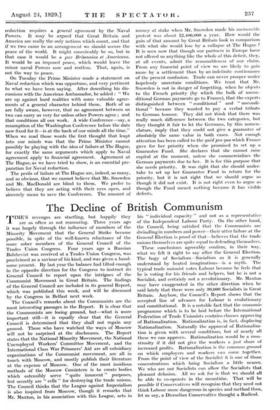The Decline of British Communism
TIME'S revenges are startling, but happily they are as often as not reassuring. Three years ago it was largely through the influence of members of the Minority Movement that the General Strike became possible, in spite of the well-known reluctance of the more sober members of the General Council of the Trades Union Congress. Four years ago a Russian Bolshevist was received at a Trades Union Congress, was proclaimed as a saviour of his kind, and was given a hand- some present. By last year the balance had tilted enough in the opposite direction for the Congress to instruct its General Council to report upon the intrigues of the Communist Movement in Great Britain. The findings of the General Council are included in its general Report, which was published this week, and will be discussed by the Congress in Belfast next week.
The Council's remarks about the Communists are the most interesting passages in the Report. It is clear that the Communists are losing ground, but—what is more important still—it is equally clear that the General Council is determined that they shall not regain any ground. Those who have watched the ways of Moscow will not be surprised at the disclosures. The Report states that the National Minority Movement, the National Unemployed Workers' Committee Movement, and the International Class War Prisoners' Aid are all subsidiary organizations of the Conununist movement, are all in touch with Moscow, and mostly publish their literature at the expense of Moscow. One of the most insidious methods of the Moscow Comintern is to create bodies which ostensibly serve "quite innocent" purposes, but secretly are " cells " for destroying the trade unions. The Council thinks that the League against Imperialism is also inspired from Moscow, though it remarks that Mr. Maxton, in his association with this League, acts in his "individual capacity" and not as a representative of the Independent Labour Party. On the other hand, the Council, being satisfied that the Communists are dwindling in numbers and power—their utter failure at the General Election is proof of that—believes that the trade unions themselves are quite equal to defending themselves.
These conclusions agreeably confirm, in their way, what we felt it right to say after the General Election. The bogy of Socialism—Socialism as it is generally understood by heated imaginations—is a myth. The typical trade unionist votes Labour because he feels that he is voting for his friends and helpers, but he is not a Socialist, and certainly not a revolutionary. Mr. Maxton may have exaggerated in the other direction when he said lately that there were only 30,000 Socialists in Great Britain. Anyhow, the Council's Report shows that the accepted line of advance for Labour is evolutionary and constitutional. It is a notable fact that the economic programme which is to be laid before the International Federation of Trade Unionists contains clauses approving of Rationalization. Rationalization is, in fact, displacing Nationalization. Naturally the approval of Rationaliza- tion is given with several conditions, but of nearly all these we can approve. Rationalization would be a mon- strosity if it did not give the workers a just share of increased profits. Rationalization is the common ground on which employers and workers can come together. From the point of view of the Socialist it is one of those concentrations which bring Socialism a little nearer. We who are not Socialists can allow the Socialists that pleasant delusion. All we ask for is that we should all be able to co-operate in the meantithe. That will be possible if Conservatives will recognize that they need not think Labour more dangerous in species and method than, let us say, a Disraelian Conservative thought a Radical.






























 Previous page
Previous page